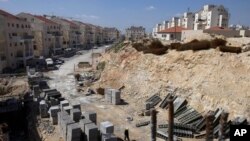UNITED NATIONS —
Palestinian Foreign Minister Riad Malki said Wednesday that if Israel continues its settlement expansion plans to the sensitive “E-1” area east of Jerusalem, the action would cross Palestinian “red lines” and the Palestinian Authority would seek redress at the International Criminal Court.
When the Palestinian Authority gained enhanced status as an observer-state in a U.N. General Assembly vote on November 29, the move opened the door for it to join several international organizations, conventions and treaties. Among those treaties is the Rome Statute of the International Criminal Court (ICC) at The Hague.
During the monthly Security Council meeting on the Israeli-Palestinian issue, Palestinian Foreign Minister Riad Malki reiterated his government’s frustration with the expansion of Israeli settlements, particularly in the wake of the November 29 vote. He is heard here through an interpreter.
“We reiterate once again, before your august council, what is abundantly clear under international law: all Israeli settlement activities are illegal. Regardless of whether it is one settlement unit or thousands of units; whether it is one settlement or an outpost; regardless of the pretext, these are all illegal,” Malki said.
The Palestinian Authority could ask the ICC to investigate Israel for war crimes for constructing settlements on occupied land.
Foreign Minister Malki told reporters after the council meeting that if Israel builds housing in the sensitive so-called “E-1” area east of Jerusalem, that it would cross Palestinian “red lines” and the Palestinian Authority would take the matter to the court at The Hague.
“If Israel would like to go further by implementing the E-1 plan and the other related plans around Jerusalem, then yes, we will be going to the ICC. We have no other choice. It depends on Israeli decision. Israel knows very well our position. President Mahmoud Abbas has said that any construction in E-1 or the surrounding [area] is considered to be trespassing the red lines and we are not going to tolerate, absolutely not going to tolerate, any construction in that particular area,” Malki said.
Palestinians say Israeli construction in the E-1 area at the center of the West Bank would make it impossible for them to form a state with viable borders and would block Arab access to East Jerusalem. Israeli supporters of the plan downplay those concerns.
Israeli Prime Minister Benjamin Netanyahu said earlier this month that "there will be construction" in the E-1 zone, which lies between East Jerusalem and a major West Bank Jewish settlement. But he said it will take time for Israel to complete the planning process for 3,000 housing units.
U.S. Ambassador Susan Rice said that Washington opposes Israel’s proposed E-1 construction plans, telling the Security Council that they would be “especially damaging to efforts to achieve a two-state solution” and that U.S. officials had urged Israeli leaders to reconsider this decision.
But she also reiterated Washington’s displeasure at the Palestinians' elevated U.N. status, saying the United States does not consider the November 29 General Assembly vote to have bestowed “statehood or recognition” on the Palestinians, and that the only route to statehood is through direct negotiations.
When the Palestinian Authority gained enhanced status as an observer-state in a U.N. General Assembly vote on November 29, the move opened the door for it to join several international organizations, conventions and treaties. Among those treaties is the Rome Statute of the International Criminal Court (ICC) at The Hague.
During the monthly Security Council meeting on the Israeli-Palestinian issue, Palestinian Foreign Minister Riad Malki reiterated his government’s frustration with the expansion of Israeli settlements, particularly in the wake of the November 29 vote. He is heard here through an interpreter.
“We reiterate once again, before your august council, what is abundantly clear under international law: all Israeli settlement activities are illegal. Regardless of whether it is one settlement unit or thousands of units; whether it is one settlement or an outpost; regardless of the pretext, these are all illegal,” Malki said.
The Palestinian Authority could ask the ICC to investigate Israel for war crimes for constructing settlements on occupied land.
Foreign Minister Malki told reporters after the council meeting that if Israel builds housing in the sensitive so-called “E-1” area east of Jerusalem, that it would cross Palestinian “red lines” and the Palestinian Authority would take the matter to the court at The Hague.
“If Israel would like to go further by implementing the E-1 plan and the other related plans around Jerusalem, then yes, we will be going to the ICC. We have no other choice. It depends on Israeli decision. Israel knows very well our position. President Mahmoud Abbas has said that any construction in E-1 or the surrounding [area] is considered to be trespassing the red lines and we are not going to tolerate, absolutely not going to tolerate, any construction in that particular area,” Malki said.
Palestinians say Israeli construction in the E-1 area at the center of the West Bank would make it impossible for them to form a state with viable borders and would block Arab access to East Jerusalem. Israeli supporters of the plan downplay those concerns.
Israeli Prime Minister Benjamin Netanyahu said earlier this month that "there will be construction" in the E-1 zone, which lies between East Jerusalem and a major West Bank Jewish settlement. But he said it will take time for Israel to complete the planning process for 3,000 housing units.
U.S. Ambassador Susan Rice said that Washington opposes Israel’s proposed E-1 construction plans, telling the Security Council that they would be “especially damaging to efforts to achieve a two-state solution” and that U.S. officials had urged Israeli leaders to reconsider this decision.
But she also reiterated Washington’s displeasure at the Palestinians' elevated U.N. status, saying the United States does not consider the November 29 General Assembly vote to have bestowed “statehood or recognition” on the Palestinians, and that the only route to statehood is through direct negotiations.




